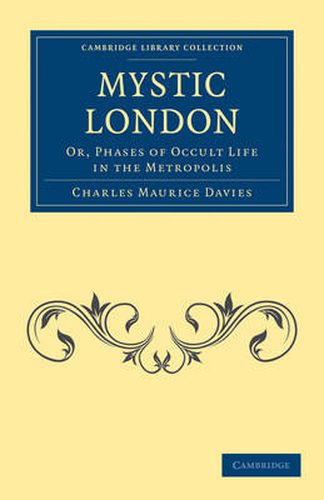Readings Newsletter
Become a Readings Member to make your shopping experience even easier.
Sign in or sign up for free!
You’re not far away from qualifying for FREE standard shipping within Australia
You’ve qualified for FREE standard shipping within Australia
The cart is loading…






The Anglican clergyman and founding member of the Society of the Holy Cross, Charles Maurice Davies (1828-1910), published Mystic London in 1875. The work is a collection of Davies’ observations and researches into urban spiritualism. It includes descriptions of London mesmerists, mediums and seances, and discussions of Darwinism, secularism and the non-religious. Davies, who discovered spiritualism in Paris in the mid-1850s, and became a committed spiritualist after the death of his son in 1865, argued in this work that the principles and practices of spiritualism did not pose any threat to Christianity and that the two movements had much in common and could peacefully coexist. The work is an indispensable source on the presence of alternative religion in London and for the beliefs and practices of nineteenth-century spiritualists. It offers a fascinating insight into Victorian experiences and attitudes towards the occult and the supernatural.
$9.00 standard shipping within Australia
FREE standard shipping within Australia for orders over $100.00
Express & International shipping calculated at checkout
Stock availability can be subject to change without notice. We recommend calling the shop or contacting our online team to check availability of low stock items. Please see our Shopping Online page for more details.
The Anglican clergyman and founding member of the Society of the Holy Cross, Charles Maurice Davies (1828-1910), published Mystic London in 1875. The work is a collection of Davies’ observations and researches into urban spiritualism. It includes descriptions of London mesmerists, mediums and seances, and discussions of Darwinism, secularism and the non-religious. Davies, who discovered spiritualism in Paris in the mid-1850s, and became a committed spiritualist after the death of his son in 1865, argued in this work that the principles and practices of spiritualism did not pose any threat to Christianity and that the two movements had much in common and could peacefully coexist. The work is an indispensable source on the presence of alternative religion in London and for the beliefs and practices of nineteenth-century spiritualists. It offers a fascinating insight into Victorian experiences and attitudes towards the occult and the supernatural.